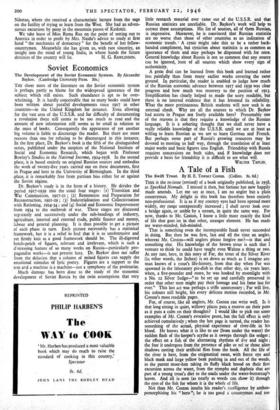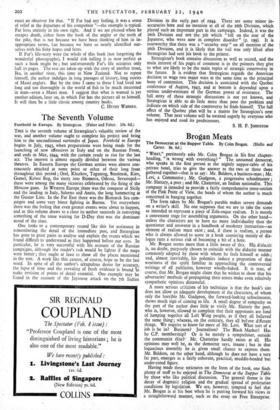A Tale of a Fish
The Swift Trout. By H. E. Towner Coston. (Collins. 8s. 6d.)
THis is the re-issue (revised) of a book originally published, in 1938, as Speckled Nomads. I missed it then, but fortune has now happily made amends. Let me say at once, I am no angler but a plain countryman. My delight in this book has therefore been entirely non-professional. It is as if my country eyes had been opened more widely, my range unexpectedly increased ; I shall never look over a bridge again, or amble by a stream, in quite the same way. For now, thanks to Mr. Coston, I know a little more exactly the kind of life that goes on in that other, stranger element. He has made me water-minded, fish-minded.
That is something even the incomparable Izaak never succeeded in doing. But then he was first, last and all the time an angler, whereas Mr. Coston—will anglers please forgive me?—is that and something else. His knowledge of the brown trout is such that I venture to think he could have taught even Walton a thing or two. At any rate, here, in this story of Far, the trout of the Silver River (in other words, the Itchen) is set down as much as I imagine any man knows of a trout's life-history, from that day when Far was spawned in the laboratory pie-dish to that other day, six years later, when, a five-pounder and more, he was hooked by moonlight with a No. 12 Silver Sedge—" to be set up and carefully preserved in order that other men might pay their homage and his fame last for ever." This last act was perhaps a trifle unnecessary ; Far will live, his colours still bright, his every delicate motion recorded, in Mr. Coston's most readable pages.
For, of course, like all anglers, Mr. Coston can write well. Is it that long sitting in quiet, willowy places puts a reserve on their pens as it puts a calm on their thoughts? I would like to pick out some examples of Mr. Coston's evocative prose, but the full effect is only achieved cumulatively ; when the last page is turned, the reader has something of the actual, physical experience of river-life in his blood. He knows what it is like to see (from under the water) the sudden flash of the keeper's scythe as it sweeps through the sedges ; the effect on a fish of the alternating rhythms of elly and night ; the fear it undergoes from the presence of pike or eel or those alien shadows casting their artificial flies from the bank. All the life of the river is here, from the enigmatical swan, with fierce eye and black mask and large yellow beak pushing in and out of the weeds, to the parent moor-hen taking its fluffy black brood on their first excursion across the water, from the nymphs and daphnia that arc part of a young trout's diet to the snails under the water-buttercup's leaves. And all is seen (as nearly as words can show it) through the eyes of the fish for whom it is the whole of life.
Not than Mr. Coston insults his reader's intelligence by anthro- pomorphising his " hero "; he is too good a countryman and too exact an observer for that. " If Far had any feeling, it was a sense of relief at the departure of his competitor "—the example is typical. Far lives entirely in his own right. And if we are pleased when he escapes death, either from the hook of the angler or the teeth of the pike, that is not because we have been thinking of him in in- appropriate terms, Lut because we have so nearly identified our- selves with his fishy hopes and fears. If Far's life-story were the whole of this book (not forgetting the wonderful photographs), I would risk calling it as near perfect as such a book might be ; but unfortunately Far's life occupies only half its pages. The rest are taken up with the story of another trout, Ika, in another river, this time in New Zealand. Not to repeat himself, the author indulges in long passages of history, long stories of Maori anglers. But by the time I came to these I had lived too long and too thoroughly in the world of fish to be much interested in man—even a Maori man. I suggest that what is wanted is yet another edition, later on, in which Far has the picture all to himself. It will then be a little classic among country books.
C. HENRY WARREN.































 Previous page
Previous page